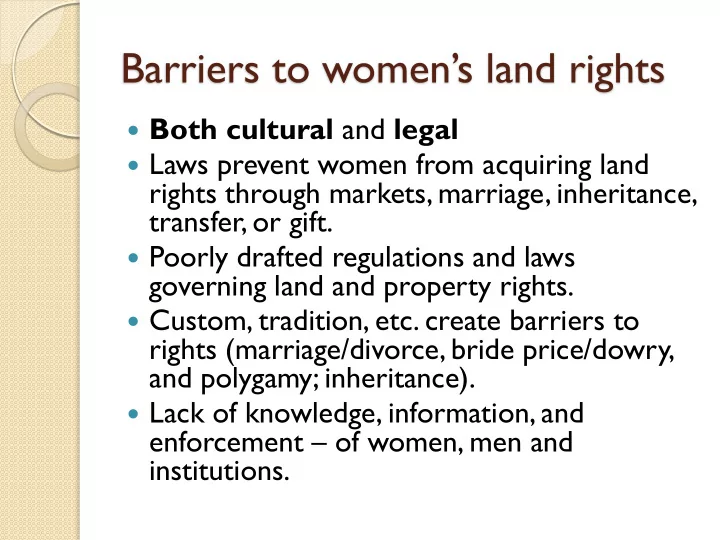

Barriers to women’s land rights Both cultural and legal Laws prevent women from acquiring land rights through markets, marriage, inheritance, transfer, or gift. Poorly drafted regulations and laws governing land and property rights. Custom, tradition, etc. create barriers to rights (marriage/divorce, bride price/dowry, and polygamy; inheritance). Lack of knowledge, information, and enforcement – of women, men and institutions.
Implementation Challenges Project implementers are not aware of social and cultural implications of land rights; don’t always understand the way that non-land laws impact women’s access. Women lack knowledge and do not participate in the process; men also do not understand the implications. Land agencies do not understand the issues and do not protect women’s rights. Women are not included in activities subsequent to land titling, (for example, access to credit or community services). Need to understand the situation and impact of project interventions – baseline assessments and monitoring.
World Bank Resources and T ools Gender Issues and Best Practices in Land Administration Projects, 2005 (report no. 32571) Gender in Agriculture Sourcebook online on Bank’s external website 4 page Toolkit: http://siteresources.worldbank.org/EXTGENAGRLI VSOUBOOK/Resources/GiA_toolkit_v4.pdf Gender in M&E in Agriculture Gender in Agriculture website: genderinag.org Resource people…. in your department, region, the Bank
T ools: T oolkit for Integrating Gender in Land Projects
Genderinag.org Website includes resources from multiple organizations – WB, FAO, IFAD, UN, etc. Also provides a forum for sharing knowledge and experiences around the world – anyone can provide content.
Other tools and resources OECD social institutions and gender index: http://my.genderindex.org – a ranking of countries according to a number of gender based statistics (% of girls in school, etc.) Gender asset gap material: http://genderassetgap.iimb.ernet.in/ - research project on the gender asset gap (land, property, household goods, financial assets) in several countries and methodology on how to better measure the gap FAO Implementation Guide on Responsible Gender-Equitable Governance of Land Tenure as part of the Voluntary Guidelines on Responsible Governance of Tenure of Land, Fisheries and Forests FAO gender and land rights database: http://www.fao.org/gender/landrights Landesa Center for Women’s Land Rights: http://www.landesa.org/women-and-land/
Recommend
More recommend